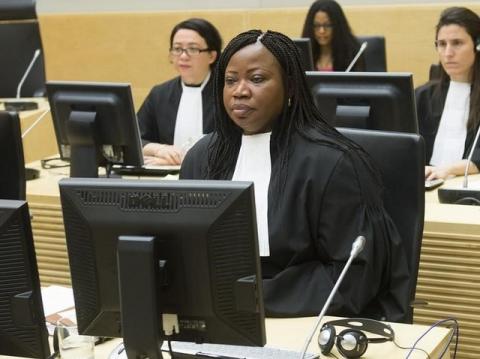Advertisement
Under fire, ICC prosecutor says to uphold fight against atrocities
THE HAGUE (Reuters) - The International Criminal Court's prosecutor said her investigations into alleged war crimes would not be impacted by the plans of three African countries to withdraw from the court and she would keep going after the perpetrators of atrocities.
Fatou Bensouda said her office would press ahead with the preliminary investigation in Burundi and her work had the support of more than 120 other member states.
Gambia, South Africa and Burundi notified the United Nations in October and November of their plans to withdraw from the ICC. The withdrawals become effective one year after the notification is filed.
To date, all but one of the court's 10 investigations have been in Africa and its five convicted suspects are from Democratic Republic of Congo, Central African Republic and Mali.
The ICC rejects allegations of bias against African nations, arguing many of the cases were brought by African governments themselves and that it has 10 preliminary inquiries or investigations into alleged atrocities in Afghanistan, Colombia, Georgia, Iraq, the Palestinian Territories and Ukraine.
Bensouda, a Gambian former justice minister, said the court began its work in 2002 with overwhelming African support and that African countries had requested the ICC's intervention.
"Even if one country decides to withdraw from the ICC, this I believe, for the continent, speaking as an African, is a setback for the continent and this is also a regression for the continent," she said.
Russia, which is not a member of the court but signed its founding Rome Statute, said this month it would remove its signature and the Philippines is considering withdrawing its membership.
'DON'T LOOK AWAY'
Bensouda countered concerns of a mass departure of member states and said all other states had renewed their commitment to the court, which has a mandate to prosecute war crimes, crimes against humanity and genocide.
The ICC is a court of last resort, only intervening in member countries when national jurisdictions are unable or unwilling to prosecute mass atrocities.
Bensouda launched a preliminary investigation in Burundi in April after political violence killed hundreds of people and forced hundreds of thousands to flee abroad.
"We will continue to do our work with respect to what we have started in Burundi," she said, saying its obligations under the Rome Statute remained until the one-year notification period ended.
If, during that time, prosecutors determine that crimes must be formally investigated, Burundi would be obligated to cooperate with the court, she said.
In the Philippines, which joined the court in 2011, the prosecutor warned in October that the extrajudicial killing of thousands of alleged drug users and dealers could constitute crimes that fall under her jurisdiction. The allegations are not the subject of a preliminary investigation, the first legal step toward a prosecution.
"It is important as prosecutor of the ICC to raise concerns," she said. "It is also important that I don't look away because this is exactly why this court was established."
(Editing by Janet Lawrence)



















Add new comment